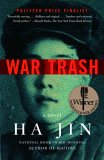Summary | Excerpt | Reading Guide | Reviews | Readalikes | Genres & Themes | Author Bio

Critics' Opinion:
Readers' Opinion:
First Published:
Oct 2004, 368 pages
Paperback:
May 2005, 368 pages
One morning I went downtown to an army hotel to fetch some slides that showed the current situation in Korea. On my way there, I saw a squadron of Mustangs coming to strafe the people working on the twin bridges over the Yalu. As the sirens shrilled, dozens of antiaircraft guns fired at the planes, around which flak explosions clustered like black blossoms. One of the Mustangs was hit the moment it dropped its bombs, drawing a long tail of smoke and darting toward the Yellow Sea. As they watched the falling plane and the hovering parachute, some civilians applauded and shouted, "Good shot!"
We drilled with our new weapons and learned about the other units' experiences in fighting the American and the South Korean armies. We all knew the enemy was better equipped and highly mechanized with air support, which we didn't have. But our superiors told us not to be afraid of the American troops, who had been spoiled and softened by comforts. GIs couldn't walk and were road-bound, depending completely on automobiles; if no vehicles were available, they'd hire Korean porters to carry their bedrolls and food. Even their enlisted men didn't do KP and had their shoes shined by civilians. Worst of all, having no moral justification for the war, they lacked the determination to fight. They were all anxious to have a vacation, which they would be given monthly. Even if we were inferior in equipment, we could make full use of our tactics of night fighting and close combat. At the mere sight of us, the Americans would go to their knees and surrender-they were just pussycats. To arouse the soldiers' hatred for the enemy, a group of men, led by a political instructor, pulled around a hand truck loaded with a huge bomb casing which was said to be evidence that the U.S. was carrying on bacteriological warfare. They displayed the thing at every battalion, together with photographs of infected creatures, such as giant flies, rats, mosquitoes, clams, cockroaches, earthworms. The germ bomb, which was said to have landed near the train station, was almost five feet long and two feet across, with four sections inside. This kind of bomb, we were told, would not explode; it would just open up when it hit the ground to release the germ carriers. To be honest, some of us had rubbed shoulders with Americans when we were in the Nationalist army, and we were unnerved, because we knew the enemy was not only superior in equipment but also better trained.
Throughout this period we attended regular meetings at which both civilians and soldiers would condemn American imperialism. An old peasant said his only farm cattle, a team of two, had been shot dead by a U.S. plane while he was harvesting sweet potatoes in his field near the border. A woman soldier walked around among the audience, holding up large photographs of Korean women and children killed by the South Korean army. A reporter spoke about many atrocities committed by the American invaders. Sometimes the speakers seized the occasion to vent their own grievances. They often identified the United States as the source of their personal troubles. A college graduate of dark complexion even claimed to an audience of eight hundred that his health had been ruined by the American film industry, because he had watched too many pornographic movies from which he had learned how to masturbate. Now he couldn't control himself anymore, he confessed publicly. These kinds of condemnations, high and low, boosted the morale of the soldiers, who grew restless, eager to wipe out the enemy of the common people.
On the night of March 17 we crossed the Yalu. Every infantryman carried a submachine gun, two hundred rounds of ammunition, four grenades, a canteen of water, a pair of rubber sneakers and a short shovel on the back of his bedroll, and a tubed sack of parched wheat flour weighing thirteen pounds. We walked gingerly on the eastern bridge, because the western one was partly damaged. Each man kept ten feet from the one in front of him. The water below was dark, hissing and plunging. Now and then someone would cry out, his foot having fallen through a hole. A tall mule, drawing a cart, got its hind leg stuck in a rift and couldn't dislodge it no matter how madly the driver thrashed its hindquarters. The moment I passed the tilted cart, it shook, then keeled over and fell into the river together with the helpless animal. There was a great splash, followed by an elongated whirlpool in the shimmering current, and then the entire load of medical supplies vanished.
Excerpted from War Trash by Ha Jin, chapter 1 and part of chapter 2 (pages 6-20) of the hardcover edition. Copyright© 2004 by Ha Jin. Excerpted by permission of Pantheon, a division of Random House, Inc. All rights reserved. No part of this excerpt may be reproduced or reprinted without permission in writing from the publisher.





The Funeral Cryer by Wenyan Lu
Debut novelist Wenyan Lu brings us this witty yet profound story about one woman's midlife reawakening in contemporary rural China.
Your guide toexceptional books
BookBrowse seeks out and recommends the best in contemporary fiction and nonfiction—books that not only engage and entertain but also deepen our understanding of ourselves and the world around us.